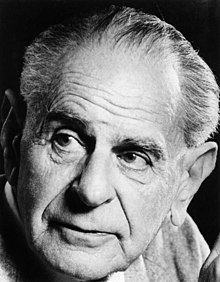
Rationalists
In philosophy, rationalism is the epistemological view that "regards reason as the chief source and test of knowledge" or "any view appealing to reason as a source of knowledge or justification". More formally, rationalism is defined as a methodology or a theory "in which the criterion of the truth is not sensory but intellectual and deductive".In an old controversy, rationalism was opposed to empiricism, where the rationalists believed that reality has an intrinsically logical structure.
5 episodes
Episodes in this category also belong to the following categories:
Condorcet
Melvyn Bragg and guests discuss the influential French philosopher and mathematician who tried to apply his Enlightenment ideas on the benefit of education to the French Revolution.
11 January 2024
Featuring: Rachel Hammersley, Richard Whatmore, Tom Hopkins
PhilosophyFrench political scientistsFrench sociologistsDeputies to the French National ConventionFrench biographers, French ethicistsHonorary members of the Saint Petersburg Academy of SciencesFrench philosophers of scienceFrench feminists18th-century philosophersTheoretical historiansAge of EnlightenmentFrench atheists18th-century French mathematiciansRationalistsBurials at the Panthéon, ParisFrench philosophers of historyFrench philosophers of educationFellows of the American Academy of Arts and Sciences18th-century French writersMembers of the Académie FrançaiseFrench male non-fiction writersFrench philosophers of cultureMembers of the French Academy of SciencesAtheist philosophersVoting theoristsFrench abolitionistsPhilosophers of religionProto-feministsEnlightenment philosophersUniversity of Paris alumniMembers of the Royal Swedish Academy of SciencesPeople killed in the French RevolutionScholars of feminist philosophy18th-century French male writersKant's Copernican Revolution
Melvyn Bragg and guests discuss Kant's ideas on how the world depends on us, on the limits of human knowledge and why we are bound to ask questions we cannot answer.
3 June 2021
Featuring: Fiona Hughes, Anil Gomes, John Callanan
PhilosophyGerman philosophers of artNatural law ethicistsGerman philosophers of scienceGerman political philosophersMetaphilosophersPhilosophers of social sciencePhilosophers of warGerman Lutherans18th-century philosophersTheoretical historiansGerman nationalists19th-century German philosophersTheorists on Western civilizationPhilosophers of literatureGerman idealistsAge of EnlightenmentPhilosophers of logicLogiciansPhilosophers of lawPhilosophers of sexuality18th-century German writersPhilosophy writersRationalists18th-century German male writersKantianismGerman philosophers of mind, German philosophers of religionWriters about religion and science18th-century German philosophers, 18th-century essayists19th-century German male writers19th-century Prussian peopleHumor researchersGerman philosophers of culture19th-century German essayistsPeople of the Age of EnlightenmentGerman agnosticsGerman male essayistsOntologistsGerman ethicists, German philosophers of educationLecturersMembers of the Prussian Academy of SciencesIdealistsNatural philosophersEnlightenment philosophersGerman epistemologistsWriters about activism and social change19th-century German non-fiction writersGerman philosophers of historyGerman male non-fiction writersGerman logicians, Kantian philosophersPlato's Gorgias
Melvyn Bragg and guests discuss arguably the most personal of Plato's dialogues in which he examines the values that led to the execution of his mentor Socrates by drinking hemlock
25 November 2021
Featuring: Angie Hobbs, Frisbee Sheffield, Fiona Leigh
PhilosophyNatural law ethicistsPlatonismAncient Greek slaves and freedmenPhilosophers of deathTheorists on Western civilizationAncient Greek physicistsMoral realistsLogiciansAncient Greek epistemologists, Ancient Greek ethicistsRationalistsEpigrammatists of the Greek AnthologyPupils of SocratesPhilosophers of educationAncient Greek philosophers of mindOntologistsPhilosophers of loveClassical theismAttic Greek writersAncient Greek logiciansAncient Greek political philosophersIdealistsNatural philosophersAncient Greek metaphysiciansAncient Athenian philosophersPopper
Melvyn Bragg discusses the philosopher Karl Popper, author of The Open Society and a seminal thinker about science.
8 February 2007
Featuring: John Worrall, Anthony O'Hear, Nancy Cartwright
PhilosophyBritish political philosophersEpistemologistsCambridge University Moral Sciences ClubForeign associates of the National Academy of SciencesTheorists on Western civilizationBritish ethicistsPhilosophers of logicKnights BachelorLogiciansPresidents of the Aristotelian SocietySocial philosophersPhilosophers of technologyRationalistsAristotelian philosophersPhilosophers of economicsWriters about religion and scienceWriters about globalizationBritish philosophers of educationBritish social liberalsRecipients of the Austrian Decoration for Science and ArtBritish male non-fiction writersPhilosophers of culturePhilosophers of mathematicsBritish historians of philosophyJewish agnosticsAcademics of the London School of Economics, British philosophers of scienceCritics of religions20th-century British philosophers20th-century Austrian philosophers, Austrian agnostics, Austrian essayists, Austrian logicians, British agnostics, British logicians, British people of Austrian-Jewish descent, Naturalised citizens of the United Kingdom, Writers from ViennaOntologistsPhilosophers of mindRecipients of the Pour le Mérite (civil class)MetaphysiciansJewish philosophersPolitical philosophersPhilosophers of religionBritish consciousness researchers and theoristsJewish ethicistsMembers of the Order of the Companions of HonourWriters about activism and social change20th-century British essayistsCritics of MarxismPhilosophers of historyFellows of the British AcademyMetaphysics writersBritish male essayistsSpinoza
Melvyn Bragg discusses the philosopher Spinoza whose profound and complex ideas about God had him celebrated as an atheist in the 18th century.
3 May 2007
Featuring: Jonathan Rée, Sarah Hutton, John Cottingham
PhilosophyEpistemologistsMetaphilosophersDeterministsAge of EnlightenmentSocial philosophersPhilosophy writersRationalistsPhilosophers of culturePhilosophers of education17th-century writers in LatinCritics of the Catholic ChurchPeople of the Age of EnlightenmentCritics of JudaismOntologistsPhilosophers of mindMetaphysiciansJewish philosophersJewish translators of the BiblePhilosophers of religionPantheistsEnlightenment philosophersBaruch SpinozaPhilosophers of sciencePhilosophers of history




